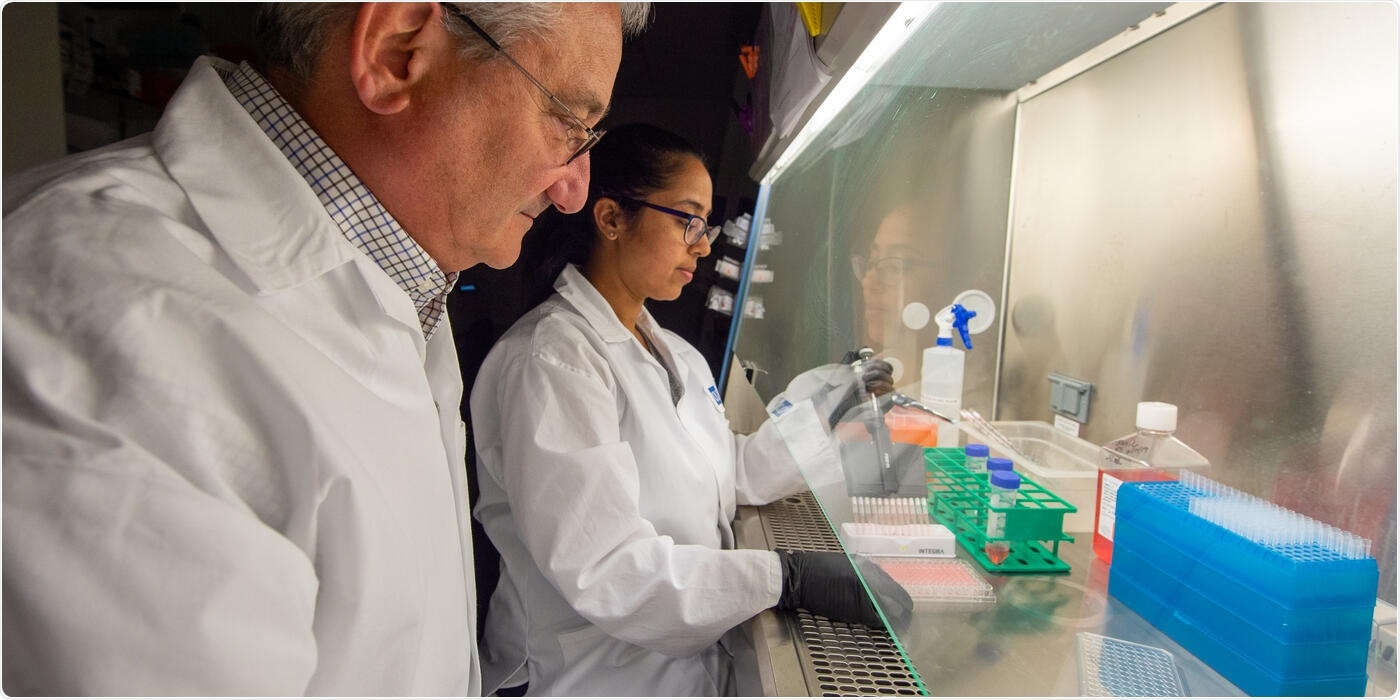The Wistar Institute has developed a synthetic DNA vaccine candidate for Middle East respiratory syndrome coronavirus (MERS-CoV) that triggered powerful immune responses and provided protective efficacy in non-human primate (NHP) models.

Wistar Drs David Weiner and Ami Patel. Image Credit: The Wistar Institute.
These outcomes were observed when the vaccine was given intradermally in a low-dose, abbreviated immunization regimen.
In a recently concluded human phase 1 trial, a similar vaccine candidate was demonstrated to be safe and tolerable with a three-dose intramuscular injection protocol and this is now in expanded analyses of a phase 1/2a trial. The latest findings were recently published in the JCI Insight journal.
While several vaccine products are being advanced against MERS and other coronaviruses, low-dose delivery and shortened regimes are crucial to rapidly induce protective immunity, particularly during emerging outbreaks, as the current SARS-CoV-2 pandemic has emphasized.”
David B. Weiner, PhD, Executive Vice President, The Wistar Institute
Weiner is also the director of the Vaccine & Immunotherapy Center (VIC) and W.W. Smith Charitable Trust Professor in Cancer Research, who headed the research work.
The researchers assessed the preventive efficacy and immunogenicity of their MERS synthetic vaccine when administered intradermally using a reduced two-dose immunization regimen compared to intramuscular administration of higher doses in NHP.
“Given that human efficacy trials for MERS vaccines may be challenging due to the low number of yearly cases, animal models such as our NHP model are valuable as a bridge with human data coming from early-phase clinical trials,” added Weiner.
In the new study, Weiner and the research team reported strong antibody neutralizing antibodies and cellular immune responses in all the tested conditions. A stringent virus challenge experiment demonstrated that when compared to unvaccinated control animals, all vaccine groups were safe from MERS-CoV.
But the low-dose schedule with intradermal delivery was more effective in managing the disease and symptoms when compared to the higher dose administered intramuscularly in NHP models.
To our knowledge, this is the first demonstration of protection with an intradermally delivered coronavirus vaccine. Intradermal delivery of synthetic DNA vaccines has significant advantages for rapid clinical development. It can be dose sparing and has higher tolerability in people compared with intramuscular injection. The positive results of this study are important not only for the advancement of this MERS vaccine but also for development of other vaccines.”
Ami Patel, PhD, Study Lead Author, Caspar Wistar Fellow, Vaccine & Immunotherapy Center
“Our team is also advancing a COVID-19 vaccine through clinical trials, and we were able to do so in a very short time thanks to our previous experience developing the MERS vaccine,” Weiner added.
Most significantly, no signs of adverse effects were found in any of the dosing classes in comparison with unimmunized control animals. By assessing a huge panel of blood cytokines, the researchers demonstrated a substantial reduction in all inflammation mediators, which further indicated that the vaccine avoids the destructive inflammation caused by coronaviruses.
In the past twenty years, three new coronaviruses have emerged and caused human outbreaks. The current SARS-CoV-2 pandemic has further emphasized the importance of rapid infection control for coronaviruses and other emerging infectious diseases. Vaccine candidates that are simple to deliver, well tolerated, and can be readily deployed in resource-limited settings will be important to achieve control of infection.”
Emma L. Reuschel, PhD, Study Co-Author and Staff Scientist, Weiner lab
Source:
Journal reference:
Patel, A., et al. (2021) Intradermal delivery of a synthetic DNA vaccine protects macaques from Middle East respiratory syndrome coronavirus. JCI Insight. doi.org/10.1172/jci.insight.146082.